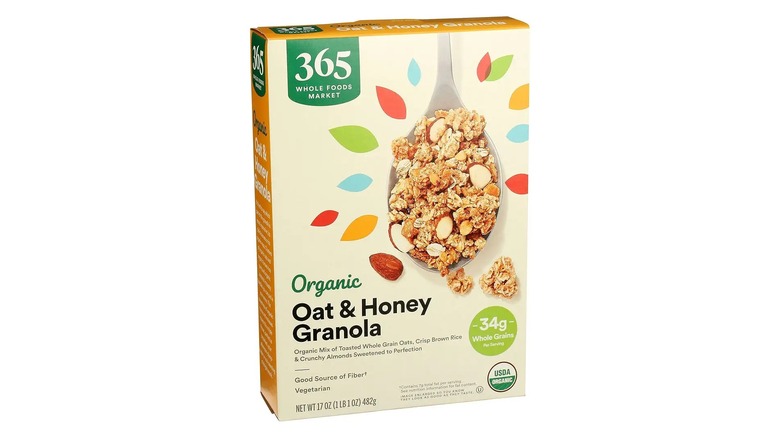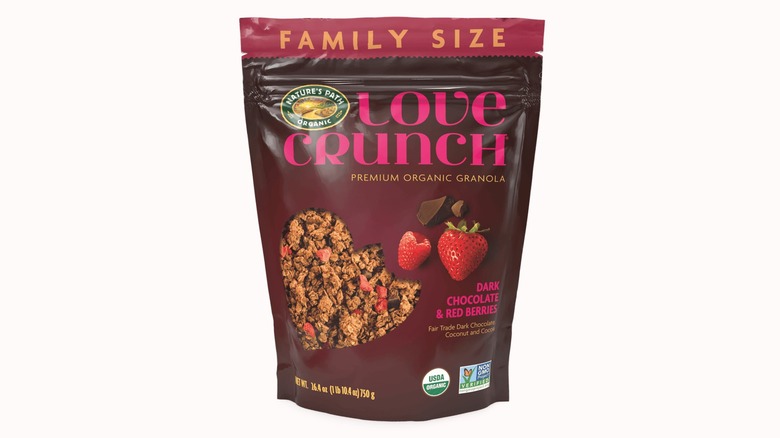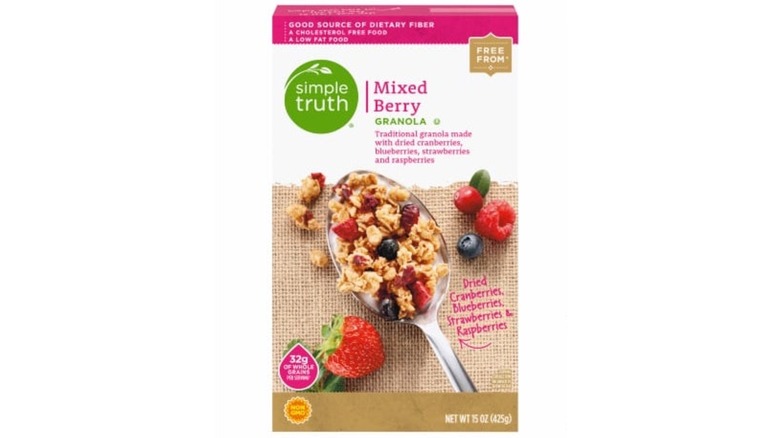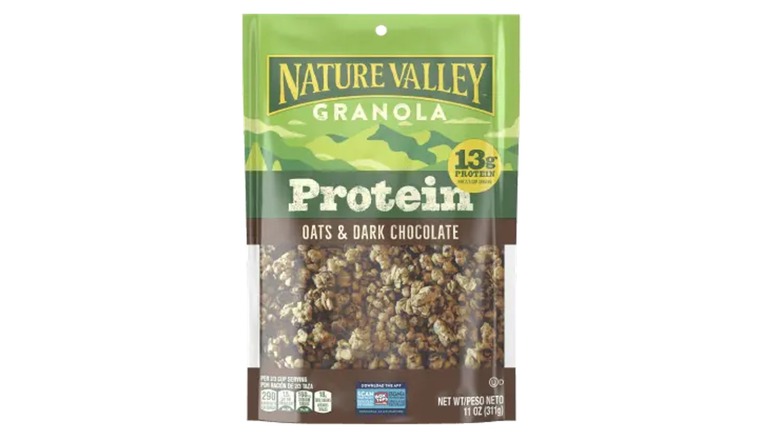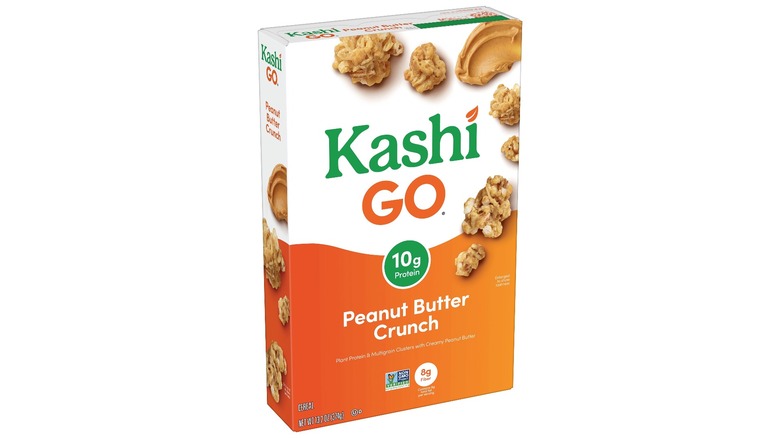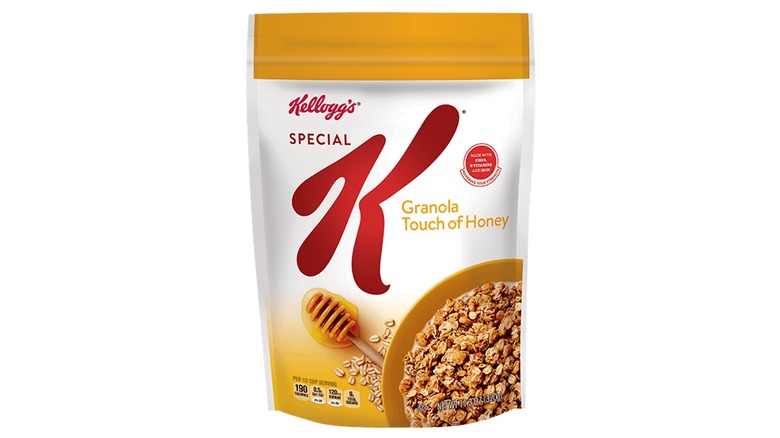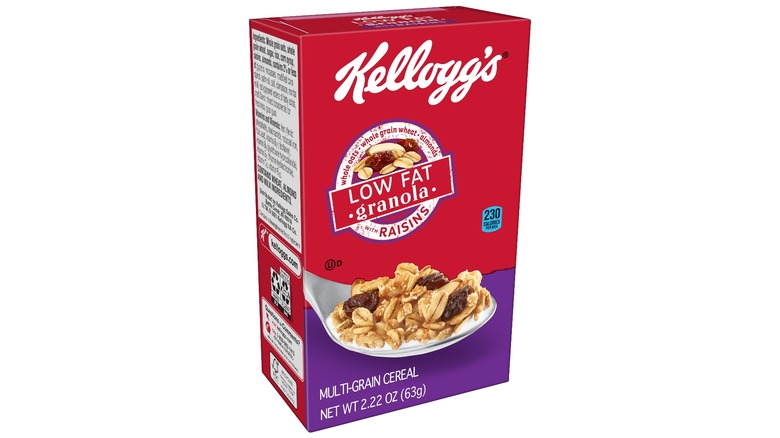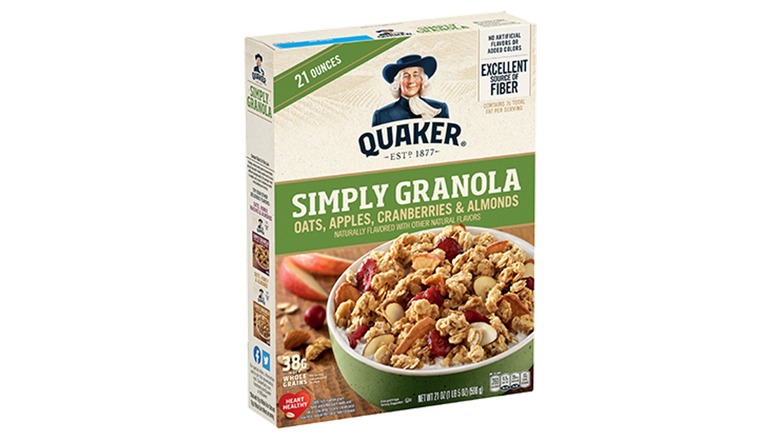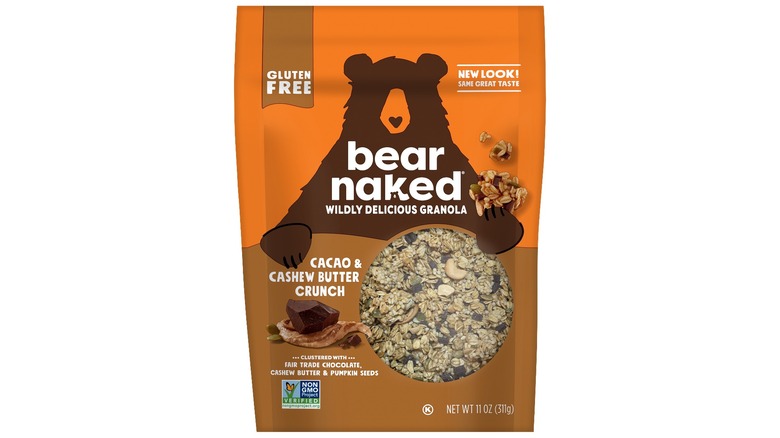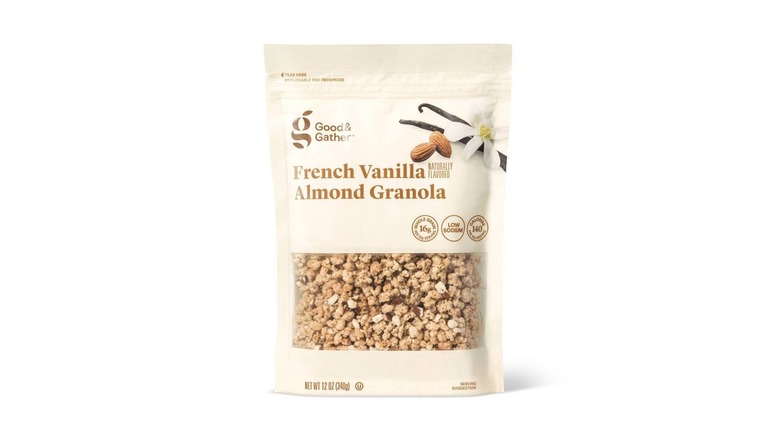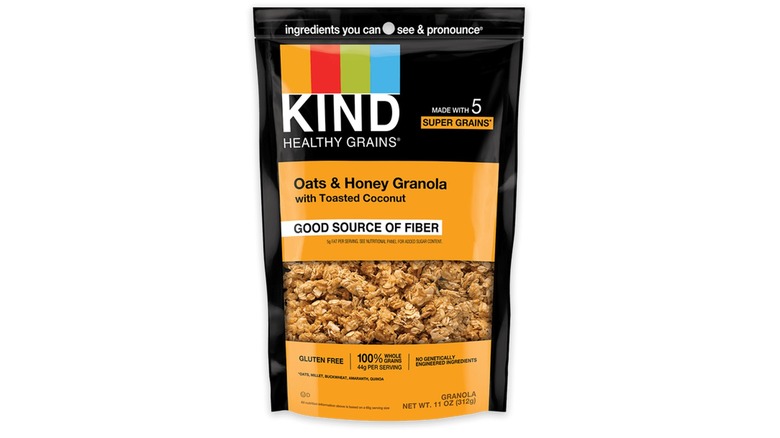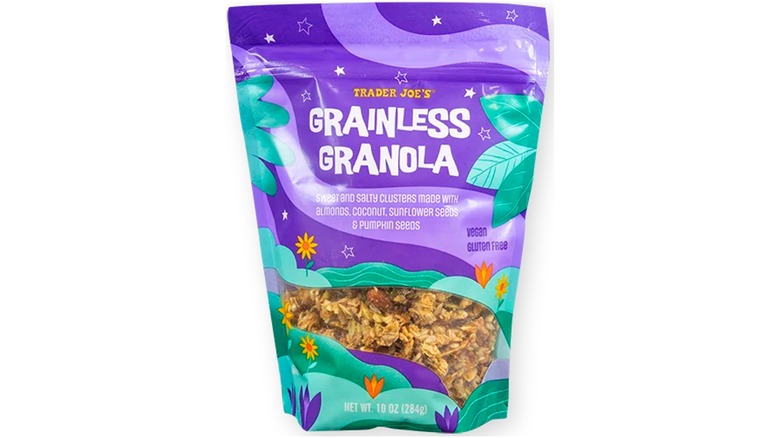The Unhealthiest Granola You Think Is Healthy
We may receive a commission on purchases made from links.
While granola was once a treat for only the most health-conscious and eco-minded folk, today you can find it in dozens of tasty flavors that cater to all palates, on the shelves seemingly everywhere from co-ops to supermarkets. The crunchy snack has become a kitchen staple largely because it's so versatile — sprinkle it over some muffins, mix it in your yogurt, or take it with you on a hike tossed into a trail mix. Others go to granola to munch on something healthy, considering it rich in fiber and whole grains, often calorie-dense for long-lasting, clean energy. Although it's seemingly nutritious, we reviewed several popular granola brands and asked, "Healthy or stealthy?" Our research revealed that an image of rolling fields on the box doesn't necessarily equal a positive wellness choice.
Thanks to sneaky preservatives, copious levels of added sugars, and ingredients we can't even pronounce, many of our favorite store-bought granolas are "junk health foods", just oats rolled in syrup that are arguably no better than a bowl of Cinnamon Toast Crunch. If you're still not convinced that you should be making your own granola, take a look at our list of some of the unhealthiest store-bought varieties for further motivation.
365 Organic Oat & Honey Granola
Whole Foods might be one of the first places you think of when searching for a healthy granola snack. The supermarket chain has drummed up a reputation as the health-conscious alternative to everyday grocery stores, but just because a product is organic doesn't immediately mean it's a better wellness choice. The oat and honey granola from the chain's 365 brand appears wholesome, displaying a spoonful of clustered oats and almonds under the catchword of "organic." Take a look at the nutrition facts, though, and you'll see ½ cup contains 240 calories, 7 grams of fat, and a whopping 15 grams of added sugars –– already 30% of the recommended daily value. While the box claims the granola is a good source of fiber, it only has 3 grams per serving, meaning you're better off snacking on a handful of almonds to get the same amount of fiber with a lot less sugar.
The back of the box declares that there's "no room for icky ingredients" in your bowl, but the granola somehow has space for plenty of cane sugar, molasses, brown rice syrup, canola oil, and tocopherols. Although tocopherols are considered generally safe preservatives, Dr. Guy Crosby explained for Harvard's Nutrition Source that canola oils in our store-bought foods can often contain trace amounts of trans fats. To avoid any suspect ingredients, grab some oats and honey and make a healthier overnight oats at home.
Nature's Path Love Crunch Dark Chocolate & Red Berries Granola
Nature's Path granola sounds like a delightful cross between satisfying your sweet tooth and staying health-conscious. If it's dark chocolate and red berries, it must be good for you, right? At first glance, the nutrition facts seem to confirm this: each serving has only 130 calories, 55 milligrams of sodium, 6 grams of added sugars, and 5 grams of fat, appearing better than other store-bought granolas. Closer inspection reveals, however, that Nature's Path is pulling a serving size switcheroo –– the recommended amount listed on the bag is a mere ¼ cup or 30 grams, compared to other granolas that typically use ⅔ or even ¾ cup. Granola is one of those crunchy snacks that's easy to mindlessly munch on, meaning Nature's Path could easily veer off your wellness checklist into a caloric sugar bomb.
As for the ingredients, cane sugar comes directly after oats, followed by the ambiguous "sunflower and/or soy oil," dark chocolate chunks, a freeze-dried berry blend, and rice starch. With 7 grams of carbs per serving plus the added starch, this starch-and-carb-heavy granola could leave you more lethargic than energized. Considering you have much more control over the amount of sugar and starches in this chocolate cherry granola recipe, your body will thank you for sticking to homemade snacks.
Simple Truth Mixed Berry Granola
Stroll the aisles of any Kroger supermarket and you're bound to notice the mixed berry granola from the chain's Simple Truth organic brand, sealed in a box that advertises all the right things, from non-GMO and low fat to dietary fiber. The actual simple truth, however, is that this granola has many added sugars –– a serving size of ⅔ cup already delivers 20 grams! If you're watching your sweetness intake, you're potentially better off pouring yourself a bowl of Fruit Loops. It's only natural to expect that a mixed berry granola would be high in sugars –– fruit is rich in natural carbohydrates and sugars, after all. Unfortunately, Kroger's granola has a long list of added ones, including cane sugar, brown rice syrup, honey, molasses, malt barley syrup ... heck, there are even added sugars listed under the freeze-dried cranberries.
Although the nutrition label lists these added sugars as 40% of your daily value, these provide no nutritional value, and the American Heart Association recommends a daily limit of 36 grams for men and 25 for women, meaning one serving of the granola sneaks in over 50% of a healthy intake. The remaining info isn't looking as health-conscious as the box would like you to think, either –– each serving contains 3 grams of fat and 250 calories.
Nature Valley Protein Oats and Dark Chocolate Granola
Nature Valley has long been one of our go-to brands for seemingly healthy outdoor snacks, but if you pause to check out the nutrition facts post avalanche of crumbs, you'll realize the brand's granola is little better for you than an oatmeal cookie. The advertising on the bag flashes "protein" in big letters under an image of mountains fading into the distance, implying this granola is the perfect companion for long-lasting energy on your hiking escapades. Its ingredients are far from simple, however, including soy protein isolate to achieve 13 grams of protein per serving, plus rice starch, soy lecithin, baking soda, and tocopherols. When you can add unique and tasty ingredients like tahini to your granola, why bother consuming all the store-bought preservatives that prioritize shelf-life? What's more, the granola also has an element of "canola and/or sunflower oil," both of which are possible perpetrators of inflammation in the body (via Healthline).
Every ⅔ cup delivers a hefty 280 calories, 160 milligrams of sodium, 8 grams of fat, and 17 grams of added sugars, which should come as no surprise seeing as the ingredients include semisweet chocolate chunks, tapioca syrup, molasses, and straight up sugar. If you're looking for something healthy to graze on, Nature Valley is doing little more than offering a spike in blood sugar before the eventual crash.
Kashi Go Peanut Butter Crunch
When shopping for granola, remember this punchy piece of advice from a health advocate on TikTok, "Kashi Go? Kashi no." Dismantling the wholesome facade of Kashi's granolas, the TikToker pointed out potentially unwelcome additions that could make this an questionable choice, like canola oil, peanut oil, and acacia gum, which aren't necessarily doing your body any favors and definitely aren't included in these tips for making the best granola. With brown rice syrup, cane sugar, and molasses, the granola also teeters into too-sweet territory, delivering 10 grams of added sugars per serving. Oddly, the serving size is listed as ¾ cup or 53 grams, while other store-bought granolas consider 53 grams as about ½ cup –– meaning something may not be adding up with Kashi.
Whatever the serving size, the granola contains 220 calories, 130 milligrams of sodium, 10 grams of protein, and 9 grams of fat. You'll also find other common ingredients in each bite like soy flakes, oats, a puffed whole grain blend, and peanut butter –– although one taste-testing Redditor lamented that the granola was more sweet than nutty, lacking peanut butter's true savoriness. More alarming are the comments on the brand's product page, with two alleged customers complaining of ultra-hard pieces mixed throughout the granola, reportedly resulting in a broken tooth and costly crown for one.
Special K Touch of Honey Granola
Special K has a certain reputation as the healthy choice among store-bought breakfast foods, but maybe that's because it's surrounded in the aisle by more of Kellogg's sugary cereals like Frosted Flakes and Apple Jacks. With "2% or less of honey" listed in the granola's ingredients, the "touch of honey" referenced in the granola's name isn't technically a lie, but it suggests just a hint of crunchy sweetness. Instead, each ½-cup serving has nine grams of added sugars, which are derived from sweeteners like sugar, corn syrup, and molasses.
While Special K's granola might strike you as health-conscious with its 2.5 grams of fat, 6 of protein, and 5 of fiber per serving, the recommended daily intake of fiber for most individuals is around 25 grams (via Healthline). You'd have to eat a considerable amount of the granola to achieve a fiber-rich meal, meaning the lofty sugar count paired with 190 calories and 120 milligrams of sodium would definitely add up.
After whole grain oats, rice, and oat bran, the granola contains several additions you may or may not wish to see, like modified corn starch, acacia gum, malt flavor, and a preservative known as BHT. Also used in cosmetics, it has been tested for carcinogenic properties, though research is still ongoing and it's not clear that we really need to be worried about its inclusion (via Verywell Fit). Still, you may prefer to just drizzle an actual touch of honey over homemade granola.
Kellogg's Low Fat Granola Cereal with Raisins
Maybe it's the low fat label that reels you in, or maybe it's the fact that this granola comes in tiny boxes at continental breakfasts, making it a bit easier to control your serving size. Either way, Kellogg's manages to pack a lot of unhealthy into such a small box –– in 63 grams, or about ⅔ cup, the granola delivers 230 calories, 140 milligrams of sodium, and 14 grams of added sugars, coming from an rather long list of sweeteners like corn syrup, glycerin, sugar, molasses, and malt flavor.
With just 3 grams of fat per serving, it certainly is low fat, but it's also rife with preservatives and potentially unnecessary additions, from cornstarch and palm oil to tocopherols and polyglycerol esters of fatty acids. Wellness-wise, that just sounds like a big no thank you.
While the granola has a few wholesome ingredients, like whole grain oats, almonds, raisins, and cinnamon, the most troublesome aspect is the phrase, "Contains a bioengineered food ingredient," at the bottom of the label. Just like GMO, bioengineered means something was genetically modified in the granola for agricultural or aesthetic purposes (via FDA). The jury's still out on just how concerned we need to be about bioengineered foods, but why not try out a homemade apple cinnamon oatmeal for a healthier sweet fix, instead of a store-bought granola full of possibly questionable ingredients?
Quaker Simply Granola Oats, Apples, Cranberries and Almonds
The simplicity implied in the name, paired with an image of apple slices and oats scattered on a rustic table would lead you to believe Quaker's granola represents a straightforward and nutritious breakfast. When asked if these types of granolas were healthy, however, one Redditor called it out, stating that the stuff "in a Quaker box is junk, less ingredients are better." Although it's a hefty source of whole grains and delivers 7 grams of gut-healthy fiber, the granola also incorporates 12 grams of added sugars per ⅔-cup serving, derived from sweeteners like honey, molasses, sweetened cranberries, and extra sugar. Considering most of us surely don't serve our granola in measuring cups, these added sugars will accumulate quickly if you're munching on the crunchy oats from a cereal bowl.
The granola has 25 milligrams of sodium and 7 grams of fat, but the seemingly promising 6 grams of protein come from the addition of many ingredients, like inulin, whey protein, and nonfat dry milk. While it includes some wholesome components like oats, dried apples, and almonds, the additional sunflower and canola oils plus 260 calories per serving land it among one of the worst popular granolas.
What's more, Quaker Oats recalled this specific granola along with dozens of other products for potential Salmonella contamination in late 2023 (via FDA), further denting this product's reputation.
Bear Naked Cacao and Cashew Butter Crunch Granola
The image of a bear offering you a handful of granola on the packaging is so endearing you're likely tempted to buy this granola without a second thought, but the nutrition label reveals this product might be more stealthy than healthy. It's true that the list of ingredients are quite bare and stay true to the brand's name, including whole grain oats, semisweet chocolate, cashew butter, pumpkin seeds, and ginger. Bear Naked still manages to sneak in some arguably unnecessary components, however, like "canola and/or sunflower oil," plus a load of additional sweeteners like invert cane syrup, brown rice syrup, and cane sugar to deliver 11 grams of added sugars per serving. With 115 milligrams of sodium per ½ cup, the granola also reaches almost 8% of the AHA's ideal daily limit in a rather small serving.
One TikToker explained that while we might reach for Bear Naked's granola for some healthy crunch on top of our yogurt, with 250 calories and 11 grams of fat per serving, it's leaning toward the heavy side for a snack, and something as simple as corn flakes would make for a lighter alternative. Bear Naked's granolas also came under fire on a Reddit thread for those with celiac disease, with several customers claiming they had been deceived by the gluten-free label and wondering if it could be facility-contaminated and harmful to anyone who is sensitive to gluten.
Good & Gather French Vanilla Almond Granola
With other flavors like salted caramel, cookies & cream, or strawberry shortcake, you'd expect Good & Gather's French vanilla almond to be one of the brand's healthier alternatives. Although designated as Target's health-conscious and natural store brand, Good & Gather's granola still misses the mark on our wellness checklist. The French vanilla may seem like a comparatively nutritious choice, with 140 calories, 5 grams of fat, and 8 grams of added sugar, but watch out for the serving size, which is only ⅓ cup. Depending on the size of your hand, that's less than a handful, meaning most casual consumers could easily double the nutrition amounts. Considering it also has only 3 measly grams of protein and 2 of fiber, the granola is off-balance with its relatively inflated sugar levels.
The ingredients list is refreshingly short, but apart from whole grain oats, cane sugar, and almonds, the granola includes less exciting components like canola oil, cornstarch, and barley malt extract, without a clear hint of vanilla –– unless it's hidden in the "natural flavors." One granola enthusiast even reviewed Good & Gather's product on TikTok, initially pumped to revel in its vanilla goodness. After sprinkling the granola over some yogurt, one of many tasty ways to use granola, the TikToker hesitated, "It's good," they ventured, going on to say "honestly, I'm kinda disappointed," lamenting that the granola simply doesn't deliver on its supposed vanilla flavor.
Kind Oats and Honey Granola
Even if Kind's packaging appears simple and nutritious, the granola inside the bag definitely isn't the kindest choice for your body. An MD on TikTok even went so far as to recommend that you "Toss this in the garbage." His main gripe with Kind's granola is its excessive sugar –– in a 63-gram serving, about ⅔ cup, the granola loads 250 calories and 11 grams of added sugar, via sweeteners like cane sugar, honey, molasses, and tapioca and brown rice syrups. Added sugars have snuck their way into lots of our store-bought snacks, reaping adverse effects on our heart health and energy levels. While the granola claims to be a good source of fiber, the 4 grams per serving are hardly worth the spike in blood sugar.
Among the granola's blend of oats, brown rice, millet, and amaranth, you'll also find preservatives and canola oil, which can contain small amounts of trans fats. While the back of the bag declares "0 grams of trans fat," the nutrition label lists five grams of total fats per serving. Though it's no smoking gun, we should note that the FDA allows any amount of trans fat under 0.5 grams to be listed as zero, meaning some small amount of trans fat could have slipped into this granola from the canola oil.
Trader Joe's Grainless Granola
Trader Joe's is one of our favorite affordable natural foods grocery stores, and the chain's grainless granola is a unique take on the crunchy snack. Instead of a more traditional blend of oats, rice, or barley, the grainless granola offers clusters of almonds, sunflower and pumpkin seeds, and dried coconut, something especially intriguing for customers who have gluten sensitivities. A ¾-cup serving delivers a promising 9 grams of protein and 7 of fiber, but coupled with 340 calories and 200 milligrams of sodium from sea salt, you have to be careful not to mindlessly munch on this granola.
Sweetened with coconut sugar and tapioca syrup, it has 6 grams of added sugars per serving and sticks to a short list of ingredients, but contains some concerning elements like tocopherols and coconut oil. You might assume coconut oil is a nutrient-dense alternative, but its health benefits are widely contested due to its high levels of saturated fats (via Healthline). Just one serving of this granola carries 28 grams of total fat and 11 of saturated. Although the nutrition label lists the saturated fat amount as 55% of your daily intake, the AHA would consider it almost 100%, recommending a limit of 13 grams. For the sake of your cholesterol levels and overall heart health, stick to just a nibble of this granola, or scrap it completely for a homemade pumpkin seed granola recipe.

